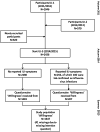Influence of perceived influenza-like symptoms on intention to receive seasonal influenza vaccination
- PMID: 40128723
- PMCID: PMC11934534
- DOI: 10.1186/s12889-025-22144-1
Influence of perceived influenza-like symptoms on intention to receive seasonal influenza vaccination
Abstract
Background: The increase in the older adult population over the coming decades emphasizes the importance of vaccinations to prevent infectious diseases among this population. Acceptance of vaccination is crucial for a successful vaccination program and insight in the motives of acceptation is therefore important. This study explores specifically the association between experiencing influenza-like illness (ILI) and other determinants for older adults on seasonal influenza vaccination acceptance. Furthermore, differences in acceptance of pneumococcal, influenza, herpes zoster and pertussis vaccines between various age groups were studied.
Methods: Three prospective observational studies (2011/2012, 2012/2013 and 2014/2015) were performed in community-dwelling older adults (≥ 60 years) to monitor ILI. During home visits, throat/nose swabs, a blood sample and a questionnaire on demographics and general health were collected. An additional questionnaire was added to the 2014/2015 study on motives and intention of older adults to accept seasonal influenza and other vaccinations, including knowledge statements on vaccination in general (n = 1647). Random Forest analyses were used to identify predictors of intention to accept seasonal influenza vaccination.
Results: Univariate analyses showed that males, persons with limited contact with children, people who have received seasonal influenza vaccination in 2014/2015, persons reporting co-morbidity, persons reporting a lower perceived health and persons with more knowledge about vaccination have a significantly higher intention to accept seasonal influenza vaccination. The univariate and prediction analyses showed no association between having experienced ILI and the intention to receive seasonal influenza vaccination. Previous influenza vaccination had by far the most predictive value; when excluding this factor, age and perceived health were the best predictors. Except for pertussis vaccination, persons aged ≥ 70 years had a higher intention to vaccinate compared to persons aged 60-69 years.
Conclusions: Our study showed that there is no association between having experienced ILI and the intention to receive seasonal influenza vaccination. Instead, previous influenza vaccination had the highest predictive value. Therefore, efforts should be made to make vaccination a habit to ensure annual vaccination. Healthcare workers, such as general practitioners (GPs) could play an important role in this because of frequent contact between older adults and GPs and the perceived importance of the advice of the GP.
Trial registration: NTR4818 (30-09-2014).
Keywords: Determinants; Influenza vaccination; Influenza-like illness; Vaccine acceptance.
© 2025. The Author(s).
Conflict of interest statement
Declarations. Ethical approval and consent to participate: This study concerns a spin-off of an existing study. This study, including this spin-off, was conducted in accordance with the Declaration of Helsinki, and approved by the Ethics Committee METC Noord Holland ICTRP Search Portal (who.int); NTR3386 and NTR4818. In addition, all participants of the study have signed an informed consent. Consent for publication: Not applicable. Competing interests: The authors declare no competing interests.
Figures



References
-
- European Commission. (2016). Eurostat Database, Accessible via: http://ec.europa.eu/eurostat/data/database
-
- European Environment Agency. (2015) Accesible via: https://www.eea.europa.eu/data-and-maps/indicators/total-population-outl...
-
- European Centre for Disease prevention and Control. (2019) Accessible via: https://vaccine-schedule.ecdc.europa.eu/
-
- [NIVEL] Netherlands Institute for Health Services Research. [Monitor Vaccinatiegraad Nationaal Programma Pneumokokkenvaccinatie Volwassenen (NPPV) 2020]. [Dutch] Utrecht. 2021. Accessible via: https://www.nivel.nl/sites/default/files/bestanden/1004651.pdf
-
- Health Council of The Netherlands. [COVID-19 En vaccinatie [Dutch]egen Pneumokokken (2)] [Dutch] the Hague. Health Council Neth, 2020; publication nr. 2020/28. Accessible via: https://www.healthcouncil.nl/documents/advisory-reports/2020/12/17/covid...
Publication types
MeSH terms
Substances
LinkOut - more resources
Full Text Sources
Medical

